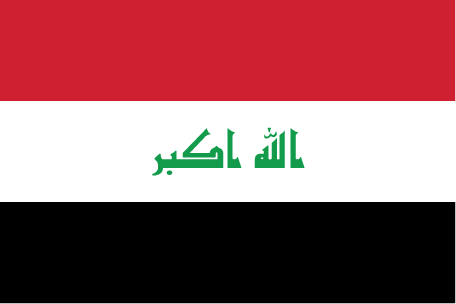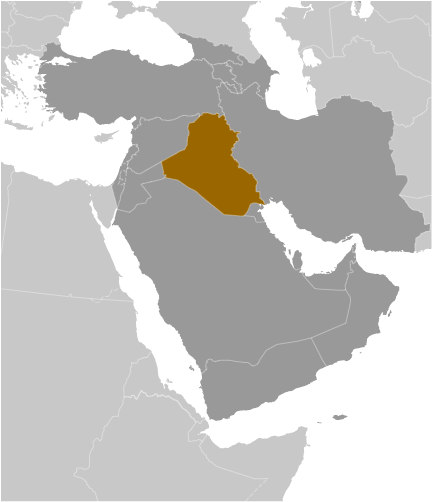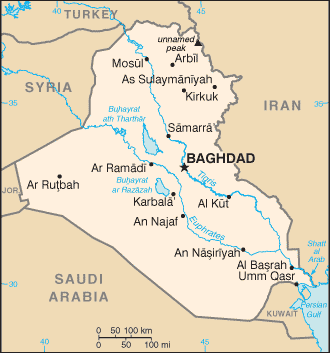Formerly part of the Ottoman Empire, Iraq was occupied by Britain during the course of World War I; in 1920, it was declared a League of Nations mandate under UK administration. In stages over the next dozen years, Iraq attained its independence as a kingdom in 1932. A "republic" was proclaimed in 1958, but in actuality a series of strongmen ruled the country until 2003. The last was SADDAM Husayn. Territorial disputes with Iran led to an inconclusive and costly eight-year war (1980-88). In August 1990, Iraq seized Kuwait but was expelled by US-led, UN coalition forces during the Gulf War of January-February 1991. Following Kuwait's liberation, the UN Security Council (UNSC) required Iraq to scrap all weapons of mass destruction and long-range missiles and to allow UN verification inspections. Continued Iraqi noncompliance with UNSC resolutions over a period of 12 years led to the US-led invasion of Iraq in March 2003 and the ouster of the SADDAM Husayn regime. US forces remained in Iraq under a UNSC mandate through 2009 and under a bilateral security agreement thereafter, helping to provide security and to train and mentor Iraqi security forces. In October 2005, Iraqis approved a constitution in a national referendum and, pursuant to this document, elected a 275-member Council of Representatives (CoR) in December 2005. After the election, Ibrahim al-JAAFARI was selected as prime minister; he was replaced by Nuri al-MALIKI in May 2006. The CoR approved most cabinet ministers in May 2006, marking the transition to Iraq's first constitutional government in nearly a half century. On 31 January 2009, Iraq held elections for provincial councils in all provinces except for the three provinces comprising the Kurdistan Regional Government and at-Ta'mim (Kirkuk) province.
Country Name
Conventional long form:Republic of Iraq
Conventional short form:Iraq
Local long form:Jumhuriyat al-Iraq
Local short form:Al Iraq
Government Type
parliamentary democracy
Capital
Name: Baghdad
Geographic coordinates:33 20 N, 44 23 E
Time difference:UTC+3 (8 hours ahead of Washington, DC during Standard Time)
Administrative divisions
18 governorates (muhafazat, singular - muhafazah) and 1 region*; Al Anbar, Al Basrah, Al Muthanna, Al Qadisiyah (Ad Diwaniyah), An Najaf, Arbil, As Sulaymaniyah, Babil, Baghdad, Dahuk, Dhi Qar, Diyala, Karbala', Kirkuk, Kurdistan Regional Government*, Maysan, Ninawa, Salah ad Din, Wasit
Independence
3 October 1932 (from League of Nations mandate under British administration); note - on 28 June 2004 the Coalition Provisional Authority transferred sovereignty to the Iraqi-controlled Government
National Holiday
Republic Day, July 14 (1958); note - the Government of Iraq has yet to declare an official national holiday but still observes Republic Day
Constitution
ratified on 15 October 2005 (subject to review by the Constitutional Review Committee and a possible public referendum)
Legal system
based on European civil and Islamic law under the framework outlined in the Iraqi Constitution; has not accepted compulsory ICJ jurisdiction
Suffrage
18 years of age; universal
Executive branch
Chief of state:President Jalal TALABANI (since 6 April 2005); Vice Presidents Adil ABD AL-MAHDI and Tariq al-HASHIMI (since 22 April 2006); note - the president and vice presidents comprise the Presidency Council)
Head of government: Prime Minister Nuri al-MALIKI (since 20 May 2006); Deputy Prime Ministers Rafi al-ISSAWI (since 19 July 2008) and Rowsch Nuri SHAWAYS (since 11 January 2010)
Cabinet:36 ministers are appointed by the Presidency Council, plus Prime Minister Nuri al-MALIKI and Deputy Prime Ministers Rafi al-ISSAWI and Rowsch Nuri SHAWAYS
(For more information visit the World Leaders website)
Legislative branch
unicameral Council of Representatives (325 seats; consisting of 317 members elected by a closed-list, proportional representation system and 8 reserved for minorities; members serve four-year terms)
Elections:last held on 7 March 2010 for an enlarged 325-seat parliament; next election to be held in 2014
Election results:Council of Representatives - percent of vote by party - Iraqi National Movement 25.9%, State of Law Coalition 25.8%, Iraqi National Alliance 19.4%, Kurdistan Alliance 15.3%, Movement for Change 4.4%, Tawafuq Front 2.7%, Iraqi Unity Alliance 2.9%, Kurdiatan Islamic Union 2.3%, Kurdistan Islamic Group 1.4%, number of seats by party - Iraqi National Movement 91, State of Law Coalition 89, Iraqi National Alliance 70, Kurdistan Alliance 43, Movement for Change 8, Tawafuq Front 6, Iraqi Unity Alliance 4, Kurdistan Islamic Union 4, Kurdistan Islamic Group 2, seats reserved for minorities 8; note - election results are preliminary
Judicial branch
the Iraq Constitution calls for the federal judicial power to be comprised of the Higher Judicial Council, Federal Supreme Court, Federal Court of Cassation, Public Prosecution Department, Judiciary Oversight Commission and other federal courts that are regulated in accordance with the law
Political Parties and Leaders
Badr Organization [Hadi al-AMARI]; Da'wa al-Islamiya Party [Prime Minister Nuri al-MALIKI]; Da'wa Tanzim [Hashim al-MUSAWI branch]; Da-wa Tanzim [Abd al-Karim al-ANZI branch]; Fadila Party [Hashim al-HASHIMI]; Future; Hadba Gathering [Athil al-NUJAYFI]; Iraqi Charter Assembly [Ahmad Abd al-Ghafur al-SAMARRI]; Iraqi Constitutional Party [Interior Minister Jawad al-BULANI]; Iraqi Front for National Dialogue [Salih al-MUTLAQ]; Iraqi Islamic Party or IIP [Usama al-TIKRITI]; Iraqi Justice and Reform Movement [Shaykh Abdallah al-YAWR]; Iraqi National Congress or INC [Ahmad CHALABI]; Iraqi National Movement or INM [former Prime Minister Ayad ALLAWI]; Islamic Supreme Council of Iraq or ISCI [Ammar al-HAKIM]; Kurdistan Democratic Party or KDP [Kurdistan Regional Government President Masud BARZANI]; National Gathering [Deputy Prime Minister Rafi al-ISSAWI]; National Reform Trend [former Prime Minister Ibrahim al-JAFARI]; Patriotic Union of Kurdistan or PUK [Jalal TALABANI]; Renewal List [Vice President Tariq al-HASHIMI]; Sadrist Trend [Muqtada al-SADR]; Sahawa al-Iraq [Ahmad al-RISHAWI]; Solidarity Bloc [Qasim DAUD]; Tawafuq Front
note: numerous smaller local, tribal, and minority parties
Political pressure groups and leaders
Sunni militias; Shia militias, some associated with political parties
International organization participation
ABEDA, AFESD (suspended), AMF, CAEU, FAO, G-77, IAEA, IBRD, ICAO, ICRM, IDA, IDB, IFAD, IFC, IFRCS, ILO, IMF, IMO, IMSO, Interpol, IOC, IPU, ISO, ITSO, ITU, LAS, MIGA, NAM, OAPEC, OIC, OPCW, OPEC, PCA, UN, UNCTAD, UNESCO, UNIDO, UNWTO, UPU, WCO, WFTU, WHO, WIPO, WMO, WTO (observer)
Diplomatic representation in the US
Chief of mission:Ambassador Samir Shakir al-SUMAYDI
Chancery:3421 Massachusetts Ave, NW, Washington, DC 20007
Telephone:[1] (202) 742-1600
FAX:[1] (202) 333-1129
Diplomatic representation from the US
Chief of mission: Ambassador Christopher R. HILL
Embassy:Baghdad
Mailing address:APO AE 09316
Telephone:1-240-553-0589 ext. 5340 or 5635; note - Consular Section
FAX:NA
Flag description
three equal horizontal bands of red (top), white, and black; the Takbir (Arabic expression meaning "God is great") in green Arabic script is centered in the white band; design is based upon the Arab Liberation colors; the Council of Representatives approved this flag in 2008 as a compromise temporary replacement for the Ba'athist Saddam-era flag
note: similar to the flag of Syria, which has two stars but no script, Yemen, which has a plain white band, and that of Egypt, which has a gold Eagle of Saladin centered in the white band










